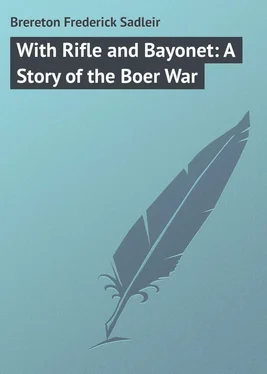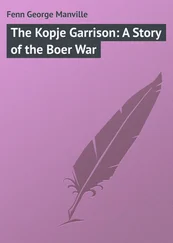Frederick Brereton - With Rifle and Bayonet - A Story of the Boer War
Здесь есть возможность читать онлайн «Frederick Brereton - With Rifle and Bayonet - A Story of the Boer War» — ознакомительный отрывок электронной книги совершенно бесплатно, а после прочтения отрывка купить полную версию. В некоторых случаях можно слушать аудио, скачать через торрент в формате fb2 и присутствует краткое содержание. Жанр: foreign_prose, foreign_children, на английском языке. Описание произведения, (предисловие) а так же отзывы посетителей доступны на портале библиотеки ЛибКат.
- Название:With Rifle and Bayonet: A Story of the Boer War
- Автор:
- Жанр:
- Год:неизвестен
- ISBN:нет данных
- Рейтинг книги:5 / 5. Голосов: 1
-
Избранное:Добавить в избранное
- Отзывы:
-
Ваша оценка:
- 100
- 1
- 2
- 3
- 4
- 5
With Rifle and Bayonet: A Story of the Boer War: краткое содержание, описание и аннотация
Предлагаем к чтению аннотацию, описание, краткое содержание или предисловие (зависит от того, что написал сам автор книги «With Rifle and Bayonet: A Story of the Boer War»). Если вы не нашли необходимую информацию о книге — напишите в комментариях, мы постараемся отыскать её.
With Rifle and Bayonet: A Story of the Boer War — читать онлайн ознакомительный отрывок
Ниже представлен текст книги, разбитый по страницам. Система сохранения места последней прочитанной страницы, позволяет с удобством читать онлайн бесплатно книгу «With Rifle and Bayonet: A Story of the Boer War», без необходимости каждый раз заново искать на чём Вы остановились. Поставьте закладку, и сможете в любой момент перейти на страницу, на которой закончили чтение.
Интервал:
Закладка:
Jack was delighted at the prospect before him, and made up his mind to get his leg sound again as quickly as possible. Save for a trip on the Continent with his father he had never left the shores of old England, and now the knowledge that in a short time he would be on board a huge ocean-going vessel bound for Africa, the land of gold and diamonds, Zulus, ostriches, and lions, filled him with the highest spirits, and served, to no small extent, to relieve the tedium of his long stay in hospital.
A month afterwards he was staying with the Hunters at a fine hotel near Piccadilly, and a week later had been able to give evidence at the Old Bailey – where he was complimented for his pluck by the judge, – and had seen the four ruffians who had attempted to obtain possession of the bag of diamonds condemned to heavy sentences.
In a fortnight they had set sail from Southampton, and were well in the Channel. It was a lovely summer’s day, and Jack enjoyed the change immensely. Reclining in a long cane chair, propped up with cushions and wrapped in a rug, he was a subject of interest to the passengers, and before many days had passed was on the best of terms with all. Indeed, had he but known it, he was thought a deal of by them, for Mr Hunter and Wilfred had not failed, when they joined the gentlemen in the smoking-room, to tell how his leg became damaged; while Mrs Hunter confided it to the ladies after dinner in the drawing-room.
Day by day Jack’s leg grew stronger and more firmly knit, and very soon, when the sea was quite smooth, he was able to hobble about the deck with the help of a crutch. Before the voyage was over he had discarded the plaster splint with which his thigh had been encased, and by the time the big ship steamed into Table Bay and whistled for the authorities to come off and give instructions as to where it was to berth, he had become quite an ordinary individual once more, and there was nothing noticeable about this strong, broad-shouldered young Englishman save the fact that he walked with a slight limp. It was a glorious morning when Mr and Mrs Hunter and the two boys landed, and as they were not to take the train for Johannesburg till the following day, Wilfred was able to escort Jack round the town and out into the country.
Jack enjoyed it all immensely. The streets were much the same as in London, and in many respects it reminded him of home. But the people walking about were different; Englishmen were certainly in evidence, but there was a good sprinkling of other nationalities, French, German, Kafir, and especially Dutch.
The country outside, however, was very different. The vegetation, of a semi-tropical nature, was more luxuriant and green, while the scorching sun overhead, and the dusty roads underfoot, which reflected the dazzling rays, were a complete change from what he had known in this country.
Still, in spite of the glaring sun there was no doubt of the picturesqueness of Cape Town, backed as it was by its green slopes and fields, and frowned over by the sharply-cut summit of Table Mountain.
Two days later the party arrived in Johannesburg, tired and weary after their long railway journey.
“Now, Jack, you must do just as you like while you are here,” said Mr Hunter a few days after they had reached this modern city in which the Uitlander population of the Transvaal had, for the most part, taken up its residence. “Of course you will want to see Pretoria, and get a peep at his honour, dear old Kruger, whom we Englishmen love so much. Then, perhaps, you would like to accompany me to Kimberley. I go there about twice a month, and though it is a dusty, uninteresting sort of place at first sight, yet I think I can promise to open your eyes when I show you the mines. You have heard of them, of course, and are aware that they are valued at millions of pounds. On our way there, or on our return, we could take a peep at Bloemfontein, the capital of the Orange Free State, where President Steyn has his residence. It will be all new to you, and, I dare say, sufficiently interesting.”
“Thank you very much, Mr Hunter!” Jack replied. “I am already awfully interested, and should certainly like to see all there is in the country. I wonder whether you would object to my helping sometimes in the store. I am quite strong enough for that now, and I should very much like to learn how you manage matters, and particularly how your books are kept. I am sorry to say I am a terribly poor hand at accounts. Mine never came out right at the end of the month in London.”
“Mind! Of course not, Jack! I am glad to think you would care to do it. Place yourself in Wilfred’s hands. He knows all about it, and will show you how the business is carried on. Who knows? One of these days you may find shopkeeping more congenial than army life. Out here there are lots of young fellows who come from the best of houses in the old country, and yet are not ashamed to pull off their coats and put their shoulders to the wheel. Why, one man of my acquaintance, who is in a very prosperous way of business just now, in spite of the exorbitant taxation with which we have to put up, owns to a title in England, and when he was there would have no more thought of turning out in the streets of London without the time-honoured tail-coat and topper than he would have thought of flying. And here he is now, not too proud to make his living by honest means, simply because he happened to be born a lord. And there are lots more like him too. Dear me, what a shock their parents would have if they could see them now, working behind their counters with sleeves rolled up, and selling groceries or ironware as if they had been at it all their lives!”
On the following day Jack took the train for Pretoria, and had the good fortune to catch a glimpse of Paul Kruger, President of the Transvaal Republic, as he drove by in his carriage.
“Father says he’s the deepest and cleverest schemer that ever was!” exclaimed Wilfred, nodding after the carriage, “and from all one hears there can be little doubt about it. They say, too, that he is a religious man, and is something like the Puritans of old. Whatever he is, however, he is certainly one of our bitterest enemies. He simply loathes the sight of an Englishman, and won’t speak our language. He forgets all we have done for him, for I can tell you, there would have been no Kruger and no Boers in the Transvaal if it hadn’t been for our country.”
“He’s a funny-looking fellow at any rate,” answered Jack; “and why in the name of all that’s rummy he should want to wear a topper in this outlandish place is more than I can guess. If I met him at home I should take him for some dissenting minister, a trifle hard-up and out-at-elbow.”
“Hard-up!” exclaimed Wilfred in disgust. “Don’t make that mistake, Jack. Paul Kruger is no pauper. He is certainly one of the wealthiest of the Boers.”
And this was exactly the case. President Kruger was a man who had for many years not only managed the affairs of this particular country, but had also contrived to look well after his own. It was only a glimpse that Jack caught of him, but it was quite sufficient to impress the features on his mind.
Paul Kruger was a heavily-built man, arrayed in black from head to foot, which shone as all threadbare and worn-out clothing does. On his head was a fairly presentable top hat, and in his fat, ungainly hands he held a pair of black kid gloves.
But his face was the part which riveted one’s attention.
In anyone else’s case but the president’s it would have passed without comment, especially amongst a gathering of typical Boers. But, holding the position he did, one looked a second time, and noticed the wrinkled, jowly cheeks, fringed with a belt of straggly hair; the heavy, sleepy-looking eyes, overhung by bushy brows, and the general appearance of obtuseness.
Читать дальшеИнтервал:
Закладка:
Похожие книги на «With Rifle and Bayonet: A Story of the Boer War»
Представляем Вашему вниманию похожие книги на «With Rifle and Bayonet: A Story of the Boer War» списком для выбора. Мы отобрали схожую по названию и смыслу литературу в надежде предоставить читателям больше вариантов отыскать новые, интересные, ещё непрочитанные произведения.
Обсуждение, отзывы о книге «With Rifle and Bayonet: A Story of the Boer War» и просто собственные мнения читателей. Оставьте ваши комментарии, напишите, что Вы думаете о произведении, его смысле или главных героях. Укажите что конкретно понравилось, а что нет, и почему Вы так считаете.












